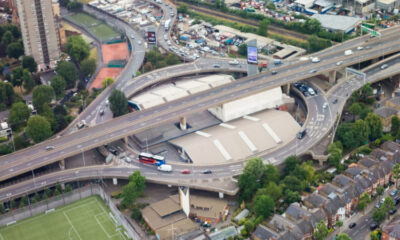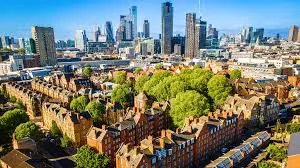Technology
Smart Cities 2025: How IoT Is Transforming London Infrastructure

In 2025, London is accelerating its transformation into a smart city, leveraging Internet of Things (IoT) technologies to optimize urban infrastructure, improve public services, and enhance sustainability. Analysts from BBC News, Bloomberg, and the Greater London Authority note that IoT-enabled systems are reshaping traffic management, energy consumption, waste collection, and public safety. By integrating sensors, real-time analytics, and connected devices, London aims to increase efficiency, reduce carbon emissions, and improve quality of life for residents and businesses alike.
Traffic and Transport Optimization
IoT is revolutionizing London’s transportation network. Analysts report that connected sensors, smart traffic lights, and AI-driven monitoring systems enable real-time traffic flow adjustments, reducing congestion during peak hours.
Public transport services, including the Tube, buses, and bike-sharing schemes, now leverage IoT analytics for predictive maintenance, dynamic scheduling, and capacity management. Analysts suggest that improved traffic efficiency not only enhances commuter experience but also reduces emissions from idling vehicles, supporting the city’s sustainability goals.
Energy Management and Smart Grids
Smart grid technology is central to London’s energy strategy. IoT-enabled meters, sensors, and demand-response systems provide utilities with real-time consumption data, enabling dynamic energy distribution and peak load management.
Analysts note that integration of renewable energy sources, including solar and wind, is optimized through IoT-driven forecasting and storage systems. By monitoring consumption patterns and energy flows, the city reduces waste, lowers costs, and strengthens resilience against grid disruptions.
Waste Management and Environmental Monitoring
IoT sensors embedded in waste bins and collection vehicles enable predictive scheduling, ensuring efficient collection routes and reducing operational costs. Analysts report that real-time monitoring of air quality, noise levels, and water usage informs policy and urban planning decisions.
Environmental data gathered through IoT devices helps the city identify pollution hotspots, optimize resource allocation, and enforce environmental regulations. Analysts highlight that IoT-driven sustainability initiatives contribute to London’s long-term climate targets.
Public Safety and Emergency Response
IoT technologies enhance public safety through smart surveillance, emergency alert systems, and connected infrastructure. Analysts note that sensors and AI-powered analytics detect unusual activity, monitor crowd density, and improve response times for emergency services.
Integrated platforms allow police, fire, and medical teams to coordinate efficiently, reducing response times and mitigating risk. Analysts suggest that IoT-enabled public safety systems increase security while maintaining operational transparency and accountability.
Urban Planning and Infrastructure Maintenance
London’s urban planning benefits from IoT-driven insights. Sensors embedded in bridges, roads, and buildings monitor structural integrity, detect wear and tear, and inform maintenance schedules.
Predictive maintenance reduces repair costs, prevents accidents, and prolongs infrastructure lifespan. Analysts highlight that real-time data enables policymakers to make informed decisions, ensuring safe, resilient, and sustainable urban environments.
Citizen Engagement and Smart Services
IoT technology facilitates direct engagement with citizens. Analysts report that mobile applications, interactive kiosks, and digital platforms allow residents to monitor energy use, report issues, and access public services efficiently.
Community-driven IoT initiatives enable residents to participate in urban management, from traffic reporting to environmental monitoring. Analysts suggest that increased citizen engagement enhances transparency, satisfaction, and responsiveness in public service delivery.
Economic Impact and Innovation
The adoption of IoT infrastructure supports London’s economy by attracting tech investment, fostering startups, and creating employment opportunities. Analysts note that AI, data analytics, and IoT integration generate new business models in smart mobility, energy management, and urban services.
International partnerships and research collaborations amplify innovation, positioning London as a global leader in smart city solutions. Analysts emphasize that the economic benefits extend beyond direct technology deployment, including improved productivity, reduced operational costs, and enhanced urban competitiveness.
Challenges and Considerations
Despite significant progress, challenges persist. Analysts identify cybersecurity, data privacy, and system interoperability as critical concerns. Ensuring robust protection against hacking, unauthorized access, and data misuse is essential for maintaining public trust.
Infrastructure costs, regulatory alignment, and equitable access are also important considerations. Analysts suggest that long-term success requires strategic investment, policy coordination, and continuous stakeholder engagement to balance innovation with social and ethical responsibilities.
Future Outlook: A Fully Connected Urban Ecosystem
Looking ahead, London is expected to continue expanding its IoT-enabled infrastructure, integrating AI, blockchain, and advanced sensor networks to create a fully connected urban ecosystem. Analysts predict that data-driven decision-making will optimize resource allocation, enhance sustainability, and improve quality of life.
The integration of IoT with emerging technologies such as autonomous transport, smart buildings, and digital twins will enable proactive urban management, predictive maintenance, and real-time service optimization. Analysts conclude that London’s smart city initiatives provide a model for global urban innovation.
Conclusion
London’s investment in IoT infrastructure in 2025 exemplifies the transformative potential of technology in urban governance. Analysts agree that smart transport, energy management, public safety, and citizen engagement systems create a more efficient, sustainable, and resilient city.
By leveraging data, connectivity, and innovation, London is redefining urban living, fostering economic growth, and positioning itself as a global leader in smart city solutions. The 2025 initiatives demonstrate how technology can enhance governance, quality of life, and environmental stewardship, ensuring London remains at the forefront of urban transformation in the digital era.






















